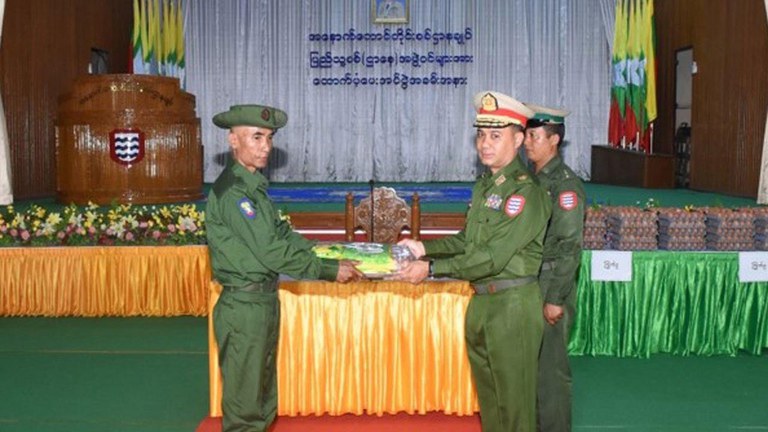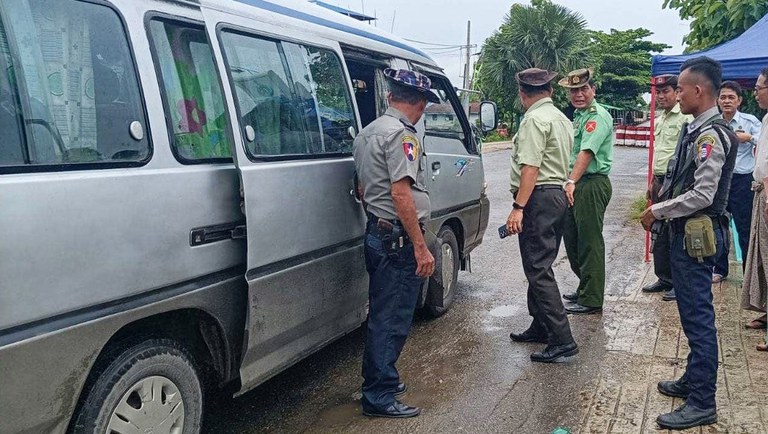Junta authorities in southwestern Myanmar’s Ayeyarwady region are compiling lists of draft-eligible residents amid a roll-out of the country’s conscription law, sources told RFA Burmese.
On Feb. 10, the junta enacted the People’s Military Service Law, prompting many civilians of fighting age to flee Myanmar’s cities, saying they would rather leave the country or join anti-junta forces in remote border areas than serve in the military, which seized power in a 2021 coup d’etat.
The junta has sought to downplay the announcement, claiming that conscription won’t go into effect until April, but RFA has received several reports indicating that forced recruitment is already under way across the country.
Residents of Ayeyarwady region’s Ingapu, Kyon Pyaw, Yae Kyi and A Thote townships said that junta authorities called a meeting of ward and village administrators in the third week of February and ordered them to gather lists of residents eligible for military service.
A resident of Kyhon Pyaw’s Inn Ma village, who like others interviewed for this report spoke on condition of anonymity due to security concerns, told RFA that authorities checked residency lists in the village and compiled a list of 35 people, both men and women, for conscription.
“There are 10 wards here and the heads of 10 households in each ward collected the lists, and handed them over to the respective ward administrators,” he said. “They didn’t need to collect the lists door to door, as they can find the information from the family lists. The disabled and ill were exempted from military services.”
Recruiting one from each village
In Ingapu, the junta’s township administration ordered ward and village administrations to recruit one person from each village-tract for military service, residents told RFA.
A resident of Ingapu’s Thet Kei Tan village said that the village administrator gave superiors the name of one young man in nearby Chin Kone village, who he said “seemed willing to join the military.”
“On the other side of our village, each household had to pay 10,000 kyats (US$5) if they did not want to serve,” he said.

In nearby Bogale township, junta authorities organized military training for teachers in front of the town hall around mid-February, residents said. On Feb. 20, leaflets were distributed in area markets persuading people to join the military.
Township authorities called a meeting with respective ward administrators and instructed them to “focus on youths who have no parents and few relatives” for recruitment, a resident told RFA.
“It wasn’t mandatory to recruit one person from each household,” he said. “Authorities recommended at the meeting that the recruitment focus on youths with no parents and those who are willing to join the military to earn a salary.”
In another Ayeyarwady township called Myan Aung, a resident told RFA that the recruitment process began around Feb. 15 in the wards and villages.
He also said that the junta conducted military training for 30 people at the headquarters of Infantry Battalion 51 in the seat of Myan Aung township on Feb. 27. Residents of the township were made to pay for the cost of two sets of military uniforms and the daily wages of the trainees, he said.
A member of the Ayeyarwady parliament, who declined to be named, told RFA that the junta leadership has focused on his region to recruit soldiers as it is their “stronghold.”
“However, I don’t think they will get the numbers they had hoped for,” he said.
Another Ayeyarwady lawmaker condemned the junta’s use of forced recruitment to implement the conscription law.
“Although they use the term ‘military service,’ people are actually being forced to work as porters or act as human shields on the battlefield,” he said. “It’s a grave violation of human rights.”
Hundreds held in Mandalay
RFA also received reports on Wednesday that hundreds of youths aged 20-30 who had been recruited for military training from around the country are being stationed in Mandalay region’s Yamethin township.
“Around 200 or 300 youths are being held at the No. 1 Police Training Depot for military training,” said a resident of the township. “They have to live in dormitories there and no one is allowed to leave.”
Another resident of Yamethin told RFA that, beginning on March 1, security had been strengthened at the facility.
“It’s not the regular training period for new police officers,” he said. “Authorities are inspecting all passers-by.”

The junta’s Information Ministry said in a social media post on Feb. 27 that there had been some “misinformation” circulating about the collection of personal data of men aged between 18 and 35. It also dismissed reports that junta security forces and administrative organizations are forcibly arresting people for military service.
Similarly, pro-junta newspapers said Wednesday that reports of youths being held for military training at the No. 1 Police Training Depot in Yamethin are false.
On Feb. 15, pro-junta media quoted spokesman Major General Zaw Min Tun as saying that around 50,000 people will be drafted into military service each year in accordance with the country’s conscription law. He added that 13 million people are currently eligible for service in Myanmar, based on a 2019 census.
Missing for more than a month
Reports of the forced recruitment in Ayeyarwady came as a resident of the region told RFA that four people arrested by junta authorities in Dedaye township for alleged possession of weapons remain missing one month after their detention.
Hlaing Myo Kyaw, Naing Myo Shwe and his wife Su Mar, and Htet Myat Soe from Dedaye’s Kyeik Taw and Ka Wet Chaung villages were arrested on Feb. 4 with drones and weapons, including rocket-propelled grenades, or RPGs.
Two others from the township – former political prisoner Wai Yan Oo and his mother – were also detained at the time.
Two weeks later, on Feb. 16, authorities shot Naing Myo Shwe dead after forcing him to lead them to a site in Kyeik Taw village where more weapons were found.
A person close to the families of those arrested told RFA that Naing Myo Shwe’s wife, Su Mar, was subsequently released, but the whereabouts of the other four remain unknown.
“They have been unable to contact Htet Myat Soe, Hlaing Myo Kyaw, Wai Yan Oo and his mother,” he said. It’s unclear where they are being held.”
Attempts by RFA to contact Khin Maung Kyi, the junta’s spokesperson and minister of social affairs for Ayeyarwady region, for comment on reports of forced recruitment and the case of the four missing residents of Dedaye township went unanswered.
According to Thailand’s Assistance Association for Political Prisoners, junta authorities have killed 4,646 civilians and arrested 26,222 others since the military’s Feb. 1, 2021, coup d’etat.
Translated by Aung Naing. Edited by Joshua Lipes and Malcolm Foster.

